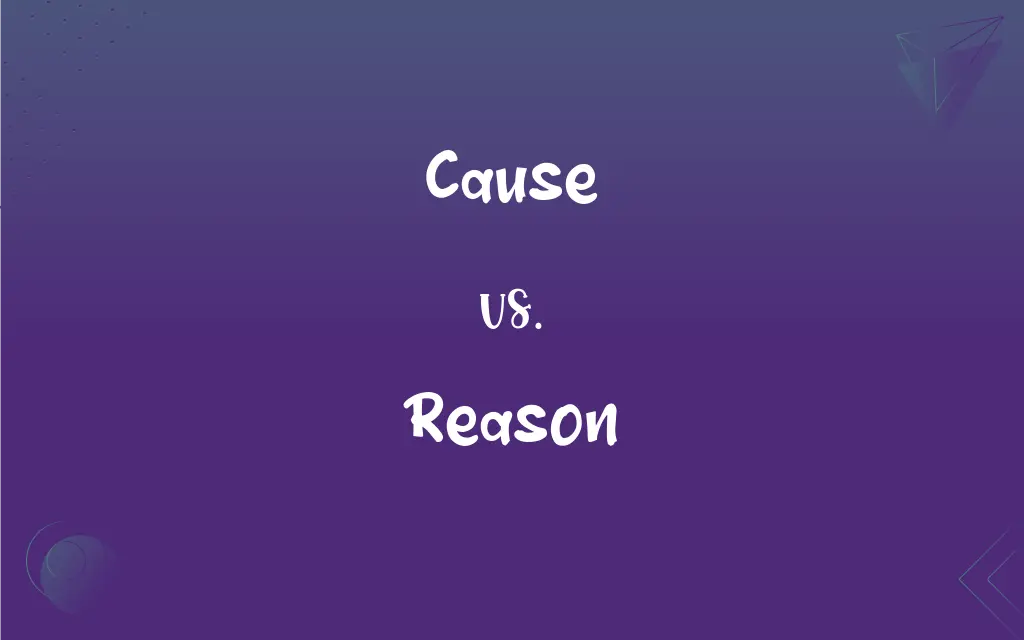Cause vs. Reason: What's the Difference?
Edited by Aimie Carlson || By Janet White || Published on November 22, 2023
Cause refers to an event or process that directly results in an effect. Reason refers to a justification or explanation for an action or event.

Key Differences
Cause refers to something that brings about an effect or a change, often in a more direct and tangible way. While, reason is more about the rationale or motivation behind a decision or action.
Causes are often seen in scientific contexts where one event directly leads to another, like a cause-and-effect relationship. However, reasons are used in explaining or justifying actions, decisions, or beliefs.
A cause can be a physical phenomenon, like gravity causing an object to fall. Whereas, a reason is often abstract, such as a belief or thought that leads to a decision.
In medicine, a cause might refer to a virus leading to an illness. In contrast, a reason could be a patient's explanation for seeking medical help.
In law, cause can mean a legal basis for an action, like a cause for a lawsuit. Reason, in this context, might involve the legal reasoning or justification behind a judgment.
ADVERTISEMENT
Comparison Chart
Definition
Direct producer of an effect
Justification or explanation for something
Context
Scientific, physical phenomena
Abstract, rational, explanatory
Nature
Tangible, observable
Abstract, often subjective
Example in Medicine
Virus leading to illness
Patient's explanation for symptoms
Example in Law
Legal basis for action
Justification behind a legal decision
ADVERTISEMENT
Cause and Reason Definitions
Cause
Origin of an effect.
The heavy rain was the cause of the flood.
Reason
Rational thought.
Logic is the basis of human reason.
Cause
Agent of change.
A catalyst is a cause in chemical reactions.
Reason
Explanation for action.
The reason for my late arrival was the traffic jam.
Cause
Reason for occurrence.
The cause of the blackout was a damaged power line.
Reason
Mental capacity.
To reason is a distinctive human ability.
Cause
Basis for action.
There was just cause for their complaint.
Reason
Justification.
His reason for declining the offer was lack of interest.
Cause
Principle or aim.
They raised money for a charitable cause.
Reason
Cause of belief.
The evidence gave her reason to doubt the story.
Cause
Because.
Reason
The basis or motive for an action, decision, or conviction
There are good reasons to learn a foreign language. See Usage Notes at because, why.
Cause
The producer of an effect, result, or consequence.
Reason
A declaration made to explain or justify action, decision, or conviction
What reasons did she give for leaving?.
Cause
The one, such as a person, event, or condition, that is responsible for an action or result.
Reason
A fact or cause that explains why something exists or has occurred
The reason for the building's collapse is unknown.
FAQs
How do 'reasons' relate to beliefs?
Reasons are often the basis or justification for holding certain beliefs.
Is a 'cause' always physical?
Often, but not exclusively, as causes can be abstract in some contexts.
What is a 'reason' in decision-making?
It's the justification or rationale behind making a decision.
Can 'cause' and 'reason' be used interchangeably?
Not always, as 'cause' is more about direct effect, while 'reason' is about rationale.
What does 'cause' mean?
Cause refers to something that directly produces an effect.
Can an event have both a 'cause' and a 'reason'?
Yes, many events can have both a direct cause and an underlying reason.
Are all 'causes' observable?
Most causes are observable, though some may be inferred from effects.
How does reasoning differ from a simple explanation?
Reasoning involves logical thinking and argument, while an explanation can be a straightforward statement.
Can an action have multiple 'causes'?
Yes, actions can have multiple contributing causes.
Is 'reason' subjective?
Reason can be subjective, as it often involves personal justifications or beliefs.
How is 'cause' used in law?
In law, 'cause' often refers to a legal reason or basis for a lawsuit.
Can 'reason' be based on emotions?
Yes, sometimes reasons are influenced more by emotions than by logic.
How does 'reason' function in arguments?
Reason provides the basis or logic behind arguments and opinions.
How important is 'reason' in philosophical discussions?
Reason is fundamental in philosophy, as it's central to logical thinking and analysis.
Is 'cause' more common in scientific contexts?
Yes, cause is frequently used in science to describe cause-and-effect relationships.
Can 'cause' imply responsibility?
Yes, in contexts like law or accidents, 'cause' can imply responsibility or fault.
Does 'cause' always precede effect?
In a cause-and-effect relationship, the cause typically precedes the effect.
Can 'causes' be disputed?
Yes, causes can be disputed, especially when they're not clearly observable.
Are 'reasons' important in moral discussions?
Yes, reasons are crucial in ethics to justify moral positions or decisions.
Are 'reasons' always logical?
Ideally, reasons should be logical, but they can be influenced by emotions or biases.
About Author
Written by
Janet WhiteJanet White has been an esteemed writer and blogger for Difference Wiki. Holding a Master's degree in Science and Medical Journalism from the prestigious Boston University, she has consistently demonstrated her expertise and passion for her field. When she's not immersed in her work, Janet relishes her time exercising, delving into a good book, and cherishing moments with friends and family.
Edited by
Aimie CarlsonAimie Carlson, holding a master's degree in English literature, is a fervent English language enthusiast. She lends her writing talents to Difference Wiki, a prominent website that specializes in comparisons, offering readers insightful analyses that both captivate and inform.































































